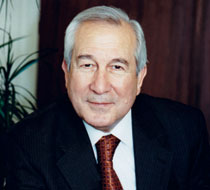
Veteran publisher Yasser Hawari, 85, dead
Paris, March 26, 2014
Veteran journalist and chairman of MediaQuest publishing, Yasser Hawari, died on March 22, the group has announced.
Hawari was 85.
Known as “the father of Pan-Arab journalism”, Hawari’s career in media spanned more than 50 years.
Hawari began his career with the weekly magazine Al Shabaka, in 1955. It was with the launch in Beirut in 1959 of Al Ousbouh Al Arabi that Hawari’s full potential flourished. This weekly magazine, which he headed until 1972, pioneered modern journalism thanks to an innovative editorial philosophy, designed around Yasser’s natural flair for in-depth, investigative reports and use of bold images.
Hawari launched another weekly magazine in 1973, Al Diyar. However, only 18 months after its launch, the project had to be aborted following an assassination attempt on him. On December 13, 1974, extremist forces tried to silence Yasser Hawari. More than 20kg of explosives, hidden in a flower vase, devastated both the magazine’s offices and the company.
Hawari, who escaped unhurt, was not deterred. Threats to both himself and his family continued. Four months later Lebanon’s civil war started and was to last for 15 years.
In such an environment, there was no choice but exile for a man who refused to compromise his values and editorial integrity. In 1976, Hawari left Lebanon for France, along with his wife and four children.
For a while, he made several attempts to continue his work within the Arab press and managed a life between Europe and the Gulf. However, it was in France – and in French – that Yasser Hawari found his next real opportunity. In 1982 he created Kol Al Arab, a new genre of magazine that gave prominence to pictures alongside short, concise, more personalised articles.
Meanwhile, he saw the need in France for unbiased, objective and in-depth information about the Arab world, and the Gulf countries. In January 1987, to help nurture a better understanding between the Arab world and Europe, he launched Arabies, a monthly magazine with the purpose of bridging the gap between France and the French-speaking world, and the Middle East in all its aspects – political, cultural, economic and more.
Arabies was a big success. Focusing on the Gulf, Northern Africa, the Levant and France, its objective and constructive approach brought a fresh perspective, celebrating achievements, while also exposing failures and flaws. It is this rare balancing act that has held readers’ interests for almost 30 years. And still does.
Trends, a monthly magazine focusing on Arab affairs, was launched in 1998 to reach out to English-speaking readers, the same way that Arabies did to French-speaking ones. Published in Paris, Trends met with great success.
In 1997, the ever-ambitious Yasser Hawari founded Mediaquest in a bid to expand his vision of bridging the East and West. This new publishing house was to cater not only to print but also television. In 2003 Mediaquest became the official representative for the Middle East of the highly successful French TV show Capital, which became, in Arabic, Saneou El Hadath. This has since developed into an eponymous monthly magazine.
Today, a leading regional player in print, digital and events, Mediaquest’s portfolio boasts prestigious titles, including Trends, Saneou al Hadath, Arabies, Communicate, Gulf Marketing Review, Haya, Marie Claire Arabia, AMEinfo, Kippreport, dotmena, and MEmob.
Hawari is survived by his wife Leila, sons Julien and Alexandre, and daughters Lynn and Johanna. –TradeArabia News Service







